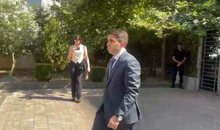
 Flash News
Flash News
"The system is on the verge of implosion!" German MPs: Vučić must listen to the protesters!
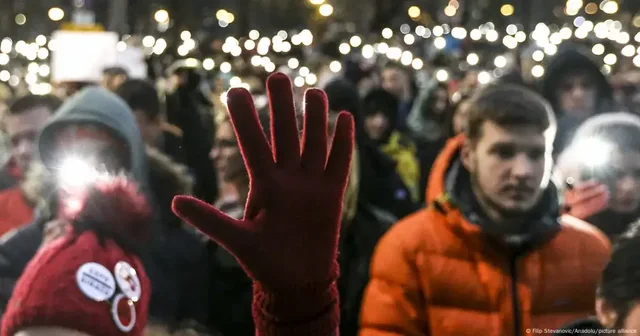
German parliamentary parties are currently very busy with the electoral campaign for the early parliamentary elections to be held on February 23. But the parliamentary groups in the Bundestag found time to talk to DW about the months-long protests in Serbia, which, according to many, could change the political landscape in this candidate country for membership in the European Union.
More European Union, less China
The spokesman for the CDU/CSU parliamentary group in the Bundestag's Foreign Policy Committee, Jürgen Hardt, told DW that the accident in Novi Sad and the protests that followed are a clear sign that Serbia needs to change something in its foreign policy orientation. "Serbia relied heavily on Chinese money and know-how in the past, and that is now being paid off." The collapse of part of the roof at the Novi Sad train station, which is part of the Chinese Silk Road project, falls directly on the Serbian government. "The mismanagement and corruption were more than obvious ," said the representative of the party that is likely to form the new government in Germany.
Hardt, who, like the rest of his party, as formulated in the election program, is committed to closer ties between the Western Balkans region and the European Union, is sending a clear message to the authorities in Belgrade: "The Serbian authorities must listen to the protesters: less China, more European Union. The future of Serbia is in the EU. This should also be reflected in the actions of the Christian Democrats."
"The people of Serbia should know"
Asked about his stance on the protests in Serbia, the Green Party rapporteur for the Western Balkans in the Bundestag, Boris Mijatović, first of all condemned the violence against demonstrators and attempts at intimidation. "The information that gangs are beating protesters to the point of hospitalization is deeply worrying. The right to assembly and freedom of expression are the cornerstones of any democratic society. Serbia, as a candidate country for EU membership, has a duty to guarantee these freedoms to its citizens in order to maintain its credibility as a partner of the European Union," Mijatović recalled.
During his term, he has visited the region very often and was an observer in the recent elections in Serbia. Referring to the tragedy in Novi Sad, Mijatovic said that "the people of Serbia have the right to know how this tragic accident happened and who is responsible. My party stands in solidarity with the citizens of Serbia who demand justice for the victims and the trial of those responsible," Mijatovic told DW.
Vučić's system on the verge of explosion
Josip Juratović, the long-time rapporteur for the Social Democratic parliamentary group for the Western Balkans, believes that the protests that have been taking place in Serbia for weeks are different in their structure and organization from previous ones. For this reason, he says that Aleksandar Vučić's days in power are numbered. "What I have been saying all along is happening right now - the Vučić regime will explode. He is fighting against rabid wasps and he can no longer win this battle ," predicts Juratović, who has so far not spared criticism of the authorities in Belgrade in his statements.
"Nothing helps him anymore, neither external nor internal allies, nor his famous public acting," Juratović told DW in a statement. For Juratović, who after decades on the benches of the Bundestag will no longer be running in the next elections at the end of February, the movement in Belgrade is special in another way. "While the whole world is surrendering to autocrats, students in the Balkans have found a way to get rid of their autocrat. Vučić cannot win this battle," says the social democrat politician who hopes that the countries of the Western Balkans "will finally escape the political mafia."
Peter Beyer, a long-time rapporteur for the CDU/CSU parliamentary group for the Western Balkans and a good expert on the situation in the region, is a little less specific than his party colleague Hardt. "We are monitoring the situation closely. Of course, the topics that dominate the election campaign in Germany push other topics into the background, but we would be very naive not to follow what is happening in our neighborhood." He explains: "Yesterday in Berlin, on the sidelines of the CDU party convention, I spoke to Serbian Finance Minister Sinisa Mali about, among other things, the protests and asked him how the situation is in the country and what we will do next," Beyer said.
He stressed that stability and democracy in Serbia are also important to Germany and that the right to protest is a fundamental democratic right. "I also reminded people that they should have the opportunity to speak out. Of course, this excludes any kind of violence. I called for an effort to find answers together with the people on how to strengthen democracy in the country and achieve stability," Beyer told DW./ DW
Latest news


'Bankers' tax evasion, Chinese CEO and former director jailed
2025-07-05 17:39:21
Kyle Walker joins English club on two-year deal
2025-07-05 17:20:24
Two cars collide on the Saranda-Delvina axis, 4 injured
2025-07-05 17:05:29
Touching gesture! Liverpool will pay Jota's family's salary until 2027
2025-07-05 16:45:18
The zodiac signs that cheat most often
2025-07-05 16:25:53

"I asked for the dismissals", Dredha tries to soften Rama's 'blow' in Vlora
2025-07-05 15:48:49
Bomb threat in Parliament, prosecutor: It was a lie
2025-07-05 15:22:28

Bardhi: The recount revealed how greedy Zeqine Balluku is in stealing
2025-07-05 14:44:29
Knife wound on the secondary road Tirana-Durrës, perpetrator sought
2025-07-05 14:37:54
Tears and pain, Diogo Jota is escorted to his final home
2025-07-05 14:21:34
Success starts with yourself! Simple ways to invest in personal development
2025-07-05 13:58:50
Unlicensed firearms found in apartment, 50-year-old arrested in Lushnje
2025-07-05 13:43:11

Tirana Court remands Skerdi Sina to prison
2025-07-05 12:59:34
Cocaine laboratory in Greece, here are the Albanians arrested and wanted
2025-07-05 12:40:16
Directed Justice/Vangjeli: SPAK does not investigate any scandal involving Rama
2025-07-05 12:22:03

Bomb alert, Police remove MPs and media from Kosovo Parliament building
2025-07-05 11:48:16
"The will of the people" and the irony of ordered resignations
2025-07-05 11:32:05
Summer drowning risk: How to enjoy the water without risking your life
2025-07-05 11:20:27
Fire situation in the country, 16 fires reported in 24 hours, 4 still active
2025-07-05 11:07:04
Car hits pedestrian at white lines, injured in serious condition in Vlora
2025-07-05 10:59:58
Mosquito-borne diseases are a growing problem in Europe
2025-07-05 10:44:13



One of Sweden's most dangerous and wanted criminals arrested in Turkey
2025-07-05 09:38:29
Foreign exchange/ How much foreign currencies are bought and sold today
2025-07-05 09:18:38

"Don't be influenced by the opinions of others", today's horoscope
2025-07-05 08:40:50

Morning Post/ In 2 lines: What mattered yesterday in Albania
2025-07-05 08:02:07

Trump says he's ready to raise tariffs to 70% on some countries
2025-07-04 22:35:52
Tre shenjat e zodiakut që do ‘pasurohen’ në Korrik
2025-07-04 22:05:09
Gaza War: Hamas Accepts US Proposal for 60-Day Ceasefire
2025-07-04 21:50:10
Autocracy in Albania, Fuga: Governance has gotten out of control
2025-07-04 21:40:51
Meta: Agriculture on credit, the new fraud!
2025-07-04 21:26:39




Vote recount in Durrës ends without changes
2025-07-04 20:12:54
Gas station explodes in Rome, 25 injured (VIDEO)
2025-07-04 20:00:20

These afternoon habits often sabotage weight loss
2025-07-04 19:39:28
Former Arsenal player Thomas Partey accused of rape
2025-07-04 19:24:21
Shepherd disappears without a trace in Delvina
2025-07-04 19:14:31

Bardho gave Zegjine's mandate/Braho: Unfair! It violates the electoral system
2025-07-04 19:01:08


Rapid developments in the Sultanates!
2025-07-04 18:00:06



Italy tightens rules for skateboard traffic
2025-07-04 17:20:18

Unusual for the time, dense fog covers the coast of Vlora
2025-07-04 16:48:01


Accident on the Shkodra-Lezhë axis, one dead and 3 injured
2025-07-04 16:14:19
Albania with fewer requests for asylum and Albanian citizenship in 2024
2025-07-04 16:06:57

Albania last for quality of life, DP: Technical government is the solution!
2025-07-04 15:42:30
Nico Williams says "No" to Barcelona, signs with Athletic Club until 2035
2025-07-04 15:33:35
Fires in the country, four fires are still active, what is the situation?
2025-07-04 15:24:20

Summer brings big changes for these 4 zodiac signs
2025-07-04 15:00:04
Osmani: MPs need to agree to a secret ballot for the Speaker of Parliament
2025-07-04 14:51:09
Serious accident on the Peqin-Elbasan axis, two injured
2025-07-04 14:37:56

GJKKO leaves in force the security measure for the head of the KPP
2025-07-04 13:58:17
Who will replace Ilir Meta and take over the leadership of the PL?
2025-07-04 13:50:36
Berisha: Dismissal of directors in Vlora, another act of 'scapegoats'
2025-07-04 13:41:46




Librazhd/ In a serious psychological state, the young man consumes pesticides
2025-07-04 13:05:07


Weapons trafficked from Kosovo to Albania, two arrested, 8 pistols seized
2025-07-04 12:33:28
Konsumimi i tepërt i çokollatës, ja cilat janë dëmet që shkakton në organizëm
2025-07-04 12:23:35

Fires in the country, 21 fires in the last 24 hours, 4 still active
2025-07-04 12:00:19
WB calls for debt transparency: Albania to publish details of every loan
2025-07-04 11:50:05
Changes in the State Police, new names expected to lead 5 police stations
2025-07-04 11:40:06
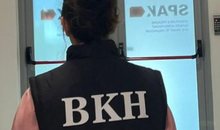
The race for the head of the BKH, the third phase on July 11
2025-07-04 11:20:23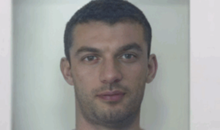
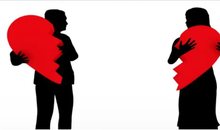
Toxic phrases that show your relationship is in trouble
2025-07-04 11:00:10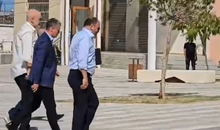

2 brothers arrested in Roskovec, cultivating narcotic plants
2025-07-04 10:38:08
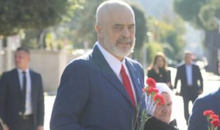
Celebrating his 61st birthday today, Rama is surprised at the pink headquarters
2025-07-04 10:21:46